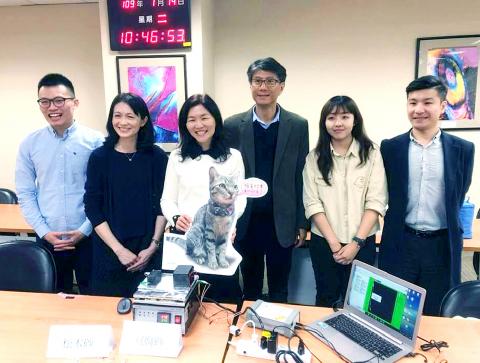A team of researchers at National Chiao Tung University (NCTU) yesterday unveiled a photo-electrical device for quickly testing urea concentration in cats, which can help detect kidney disease in felines at an early stage.
NCTU department of photonics professor Zan Hsiao-wen (冉曉雯) said that she has two cats, aged nine and 18, and that the younger one has kidney disease.
The hassle of visiting a veterinarian motivated her to design the quick-test device, she told a news conference at the Ministry of Science and Technology in Taipei.

Photo: CNA
Kidney disease is the most common chronic disease in cats older than 10, and is usually diagnosed via blood or urine tests, which cost at least NT$600 per test, in addition to other costs, said Kaohsiung-based Jong-Shing Animal Hospital vice president Huang Ming-ju (黃明如), who offered clinical advice to the team.
To detect kidney problems in cats, the team developed a device called “Dual Optical Fiber Reaction Tank” to test urine collected from a cat’s litter, as it is easier to collect than a separate urine sample, Zan said.
The detection process involves separating the urine from the litter in a reaction tank and using an acid-based solution to test the samples, Zan added.
The urine-containing solution influences optical and electrical currents that can be detected by a sensor attached to the device, she added.
The color of the solution deepens as the urea concentration increases, reducing the light that reaches the light sensor and weakening electrical currents, she said.
Cats with urea concentrations of lower than 400 millimoles might have kidney problems, as the kidneys cannot efficiently discharge urea, Zan said, adding that the device can produce test results in five minutes.
By comparison, a blood test for kidney disease can take up to an hour and kidney disease can only be confirmed after up to three months of clinical observation, Huang said.
The team used the device to test urine samples from 10 cats provided by the animal hospital, Zan said, adding that it only provides quick testing and is not intended to replace precise diagnoses by veterinarians.
As the team has only experimented with cat’s litter made of beans and wood materials, more research is needed for other materials, she added.
While other instruments for blood and urine testing can cost hundreds of thousands of New Taiwan dollars, the team’s device would only cost several thousand NT dollars, Zan said, urging businesses interested in the device to help commercialize it.
The team hopes to develop a smaller portable device with the same functionality by working with long-term collaborator Olivier Soppera of the French National Centre for Scientific Research, she said.

Starlux Airlines, Taiwan’s newest international carrier, has announced it would apply to join the Oneworld global airline alliance before the end of next year. In an investor conference on Monday, Starlux Airlines chief executive officer Glenn Chai (翟健華) said joining the alliance would help it access Taiwan. Chai said that if accepted, Starlux would work with other airlines in the alliance on flight schedules, passenger transits and frequent flyer programs. The Oneworld alliance has 13 members, including American Airlines, British Airways, Cathay Pacific and Qantas, and serves more than 900 destinations in 170 territories. Joining Oneworld would also help boost

A new tropical storm formed late yesterday near Guam and is to approach closest to Taiwan on Thursday, the Central Weather Administration (CWA) said. Tropical Storm Pulasan became the 14th named storm of the year at 9:25pm yesterday, the agency said. As of 8am today, it was near Guam traveling northwest at 21kph, it said. The storm’s structure is relatively loose and conditions for strengthening are limited, WeatherRisk analyst Wu Sheng-yu (吳聖宇) said on Facebook. Its path is likely to be similar to Typhoon Bebinca, which passed north of Taiwan over Japan’s Ryukyu Islands and made landfall in Shanghai this morning, he said. However, it

Taiwan's Gold Apollo Co (金阿波羅通信) said today that the pagers used in detonations in Lebanon the day before were not made by it, but by a company called BAC which has a license to use its brand. At least nine people were killed and nearly 3,000 wounded when pagers used by Hezbollah members detonated simultaneously across Lebanon yesterday. Images of destroyed pagers analyzed by Reuters showed a format and stickers on the back that were consistent with pagers made by Gold Apollo. A senior Lebanese security source told Reuters that Hezbollah had ordered 5,000 pagers from Taiwan-based Gold Apollo. "The product was not

COLD FACTS: ‘Snow skin’ mooncakes, made with a glutinous rice skin and kept at a low temperature, have relatively few calories compared with other mooncakes Traditional mooncakes are a typical treat for many Taiwanese in the lead-up to the Mid-Autumn Festival, but a Taipei-based dietitian has urged people not to eat more than one per day and not to have them every day due to their high fat and calorie content. As mooncakes contain a lot of oil and sugar, they can have negative health effects on older people and those with diabetes, said Lai Yu-han (賴俞含), a dietitian at Taipei Hospital of the Ministry of Health and Welfare. “The maximum you can have is one mooncake a day, and do not eat them every day,” Lai